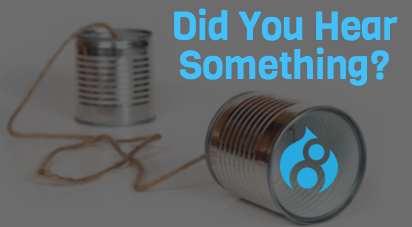Introduction
You're starting to hear things. Maybe some things about your website like upgrade to Drupal 8. People might be complaining about your website again. Doesn't it feel just like yesterday the "new" one launched?
It's that particular time when you have to start thinking about updates and upgrades. So far it’s looking like the upgrade to Drupal 8 is the way to go. But now you’re distracted, thinking about cost, manpower, and the time this is going to take. Nobody said this was like updating the software on a Mac or PC. But Drupal 6 LTS, Drupal 7, WordPress or TYPO3 options just aren’t cutting it for your organization anymore. There's talk.
These people just keep talking trash about our site!
Coworkers, department heads, even clients, or just random people have made their complaints known. Now that first quarter has kicked off, and there’s pressure to make the final decision, to get help, to come up with a migration plan, to follow through. Before any of these things happen, you need a place to start.
What is it they want?
The most common website complaints might sound all too familiar. You hear about speed, mobile issues, and navigational shortcomings. Your marketers, IT gurus, and client are calling out.
The need for speed
Loading time is effecting your bottom line. Everyone expects instant page loading Drupal 8 has serious improvements in page load speed due to the implementation of Symfony. The Drupal core code is streamlined. Moreover, Drupal 8 caches entities and will only load JavaScript when necessary. When a page is viewed, its content doesn’t need to be reloaded. Previously viewed content can b quickly loaded from the cache. Once configured and enabled, caching is completely automatic.
Mobile inclinations
Drupal 8 is mobile first. Which means this upgrade boasts a new mobile-friendly development. Aesthetically it just works. Breakpoints are built in, which keep track of height, width, and resolution. When a user views the page from a small device viewport, such as page’s horizontal elements will automatically become vertical, with lesser relevant columns being removed. Even content management is easier because as a mobile friendly CMS, Drupal enables on the go administration.
Help
This relates to mobility in the sense that it's valued by end-users; visitors need to be able to go where they want to go on your site, or they'll leave. Navigation and layouts matter.
Now if you haven't heard or considered a decoupled Drupal implementation, now's the time to learn. One size doesn't fit all; you've got options. If you need to retain complete flexibility in managing widgets on individual pages (ones that you expect will need changes down the road), a decoupled option might be best. This system provides a clean, modern, object-oriented pattern.
But the thing is, each department cares about something different. Each expects that an upgrade to Drupal 8 will see their needs met.
IT: "we need something more flexible."
If you were to ask any Drupaler, they'd tell you previous versions had significant shortcomings, and no platform is perfect. But the upgrade to Drupal 8 checks off several top issues. For starters, developers can now track changes in the configuration using version control, so updating the site is cleaner and far more reliable. Without this feature, upgrades are more tedious and potentially unorganized.
To get more advanced, Drupal exposes its data in a RESTful manner. This means it’s much easier to create and keep integrations with other systems running smoothly. These are just two of many Drupal 8 features that will make life in an IT department better for all.
The techies want new toys. By toys, they mean something highly advanced and flexible.
Drupal's community of open source fanatics, tech nerds, and others are what's driving Drupal's creation. This means Drupal is a need-based program. When a facet of the community sees a missing piece, they yell up. One of Drupal's biggest strengths is its huge community. It takes a while for an upgrade to come along (the upgrade to Drupal 8 took years for the community), but when it finally does you can expect relevance.
Marketers: "what about us?"
For content marketers, ease of publishing and editing makes their lives easier. Simplicity is something everyone can appreciate and for marketers, a clean, modern interface is the apex. But most CMS options take care of this? Publishing with Drupal 8 is smooth and simple, like most. Content creators or editors can edit text on any page without having to switch to the full edit form. But there’s got to be more than this. Today marketers need a simple, focused CMS.
Marketers, PR practitioners, and journalists agree—wait, what?
It's true. Drupal 8 is a platform used by both online news sites and digital agencies. Before they might have criticized Drupal for being too complicated. But with an upgrade to Drupal 8 what they're getting is a straightforward and flexible CMS. With previous Drupal versions being seen as too little advances or challenging for new users, Drupal 8 changed all that. Now content authoring is easy and reliable performance is guaranteed. Managers can navigate their site smoothly and use the new on-page editor with ease. More content marketers are being brought on board today—without high falutin technical skills. It's important to consider what that means for your systems.
Clients: "?"
You must ask them. Not that you shouldn't ask your marketing and IT departments, but your customers should come first, and you need specifics. By sending a questionnaire or a simple email, you can gain valuable insight from your clients, customers, or partners. Depending on their type of website (E-commerce, Education, etc.) you might get different responses. For the most part, though, speed, mobility, and ease of navigation are to be expected. If there have been complaining about the three of these, decision makers at your organization need to make changes and fast. The truth is, clients aren't tolerating slow, unresponsive, confusing sites anymore. Your competition understands this and the faster you get it the better of you'll be.
Give the people what they want: an upgrade to Drupal 8.
Having each department take a survey and gathering the results might be a wise move. But let's be real, everybody has an opinion, right? Your IT team, marketing crew, and clients are who should be driving this upgrade. If you get with them, and you remember what you've read above...
What you're hearing is a cry for change. It's starting to sound like Drupal.

Nathan Roach, Director of Marketing
Germany-based consumer of old world wine and the written word. Offline you can find him spending time with his wife and daughter at festivities in the Rhineland.

 We respect your privacy. Your information is safe.
We respect your privacy. Your information is safe.



Leave us a comment